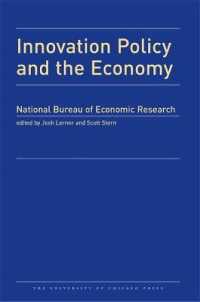- ホーム
- > 洋書
- > 英文書
- > Religion / Ethics
Full Description
Postmodern thinkers have demonstrated the fragmentation of the Enlightenment understanding of the self, society, and nature; for many, however, the postmodern alternatives--the pursuit of individual self-definition, utter skepticism regarding the relation between language and reality, or the embrace of ideological power--are unconvincing. In The Fullness of Knowing, by placing the most promising postmodern insights in dialogue with eighteenth-century critics of the Enlightenment, Daniel Ritchie argues that we can begin to overcome post-Enlightenment fragmentation without abandoning either coherence (as many postmoderns have done) or the valid insights of modern and postmodern thought (as many traditionalists have done).
Contents
Acknowledgements
Introduction: ""All Is Trash that Reason Cannot Reach"": Unenlightened Writers and the Postmodern World
Chapter One: Learning to Read, Learning to Listen in Robinson Crusoe
Chapter Two: The Hymns of Isaac Watts and Postmodern Worship: Aesthetic Knowledge as a Response to the Enlightenment Critique of Religion
Chapter Three: Jonathan Swift's Information Machine and the Critique of Technology
Chapter Four: Christopher Smart's Poetry and the Dialogue between Science and Theology
Chapter Five: Festival and Discipline in Revolutionary France and Postmodern Times
Chapter Six: Remembering Things Past: Tradition as a Way of Knowing in Edmund Burke and Hans-Georg Gadamer
Chapter Seven: Reconciling the Heart with the Head: The Poetry of William Cowper and the Thought of Michael Polanyi
Conclusion
Bibliography







